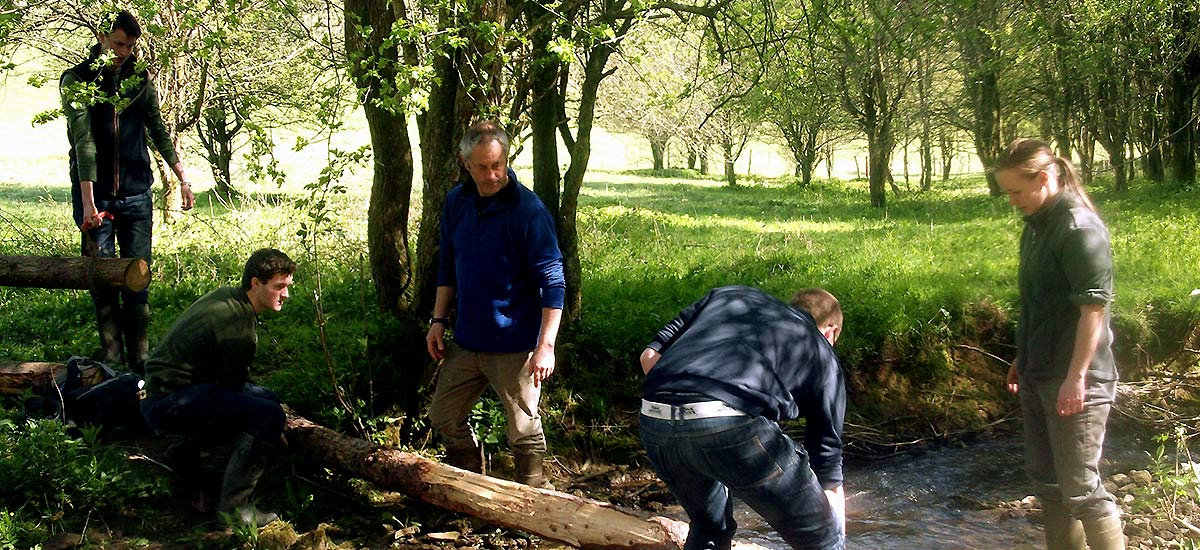FdSc Wildlife Conservation and Countryside Management
The effective conservation of wildlife, ecosystems and natural resources is vital for future sustainable development. On this course you will gain the academic knowledge, applied ecological theory and extensive hands-on field experience needed to manage habitats and conserve wildlife.
Course overview
"100% positivity score from students completing the 2025 National Student Survey for how often the course is intellectually stimulating"
You will build on your knowledge and interest in the natural world, giving you opportunities to make a difference in the wildlife conservation and countryside sectors. You will also enrich your knowledge by exploring ways in which farmland can better link in with wildlife through agri-environmental schemes, exploring the ideas of rewilding and the various roles and responsibilities of conservation organisations.
The course content is a blend of academic study and practical application based around tangible real-world case studies, keeping the learning experience alive and exciting. Field trips will reinforce learning and will include visits to conservation sites and organisations.
"100% of students agree that staff are good at explaining things"
2025 National Student Survey
In addition, you will have the opportunity to complete professionally accredited training courses such as Chainsaw, Brushcutter, Quad Bike and Tractor Driving, at no additional cost. Although there is an emphasis on practical conservation field work you will also receive training in leadership and supervisory skills.
"100% of students agree that it was easy to contact staff when they needed to"
2025 National Student Survey
With this combination of academic knowledge, practical skills and work experience, it’s no wonder that our graduates have gone on to work for prestigious organisations such as The Wildlife Trust, The National Trust and The Forestry Commission.
After successfully completing the Foundation Degree you may wish to consider progressing onto the additional 'top-up' year of study on the BSc (Hons) Wildlife and Countryside Management (Top-up) to obtain an Honours degree.
"100% of students agree that marking was fair and that marking criteria was clear"
2025 National Student Survey
Work placement
You will complete a 30-day work placement usually during the summer between your first and second year. This will give you essential skills and experience of wildlife and environmental management activities within the sector. Students have worked with UK organisations such as the RSPB, Wildlife Rescue Centres, the Farming and Wildlife Advisory Group (FWAG), the National Trust, Wildlife Trusts, RSPCA, as well as taking up placements overseas with Sea Turtle Conservation Projects and Game Reserves in Africa.
Field visits to conservation sites and organisations are not only exciting but essential to this course. Previous destinations include Knepp Estate, Rhossili Bay, British Wildlife Centre, Elan Valley and many more.
Course content
Right from your first year, you will gain grounding in work-related situations as well as academic study before developing a deeper understanding of the key issues in your second year. You will be assessed through field reports, research projects, examinations, case studies, portfolios, presentations and practical skills.
Timetables
Please note that while we make every effort to ensure that timetables are as student-friendly as possible, scheduled teaching can take place on any day of the week. Wednesday afternoons are normally reserved for sports and societies activities.
Modules
The programme is based on six modules, worth 20 credits each, per academic year. Each credit equates to about 10 hours of study time. Total study time includes scheduled teaching, independent study and assessment activity.
Full-time students normally take modules worth 60 credits per 15 week semester but this can vary depending on your elective choice. Part-time students taking proportionally fewer credits per semester. All students take a total of 120 credits per level and 240 credits for the foundation degree as a whole. The overall grade for your foundation degree is based on marks obtained for modules taken at level 4 and level 5 (weighted 30:70) accordingly.
The modules available for this degree are shown below. They may change for your year of study as we regularly review our module offerings to ensure they’re informed by the latest research and teaching methods.
Year one
- 4W002 People and Environmental Change: This module examines human impacts on environmental change across spatial and temporal scales. Topics include land use transitions, legislative frameworks, and sustainability challenges. Students participate in field trips and develop academic skills. Assessment includes a presentation and a 2000-word essay. The module supports critical evaluation of landscape dynamics, policy evolution, and the role of human management in shaping environmental outcomes.
- 4W003 Species Identification and Ecology: This module introduces species classification, ecological processes, and field survey techniques. Topics include taxonomy, ecosystem dynamics, biodiversity, and data analysis. Students engage in species identification, fieldwork, and ecological hypothesis testing. Assessment includes a 1.5-hour practical identification test and a 2000-word scientific report using field data. The module supports critical evaluation of species interactions, ecosystem change, and applied ecological skills.
- 4W004 Wildlife Handling, Ethics and Survey: This module introduces practical wildlife handling and survey techniques for conservation. Topics include species identification, anatomy, welfare, legislation, and ethical frameworks. Students engage with field trips, handling sessions, and survey design. Assessment includes a pass/fail practical handling exercise, a 30-minute identification quiz, a scenario-based ethics task, and a 2000-word professional practice report. The module supports critical evaluation of conservation ethics, fieldwork skills, and ecological data collection in wildlife contexts.
- 4A004 Soil Science and Ecosystem Services: This module explores soil health and ecosystem services within agroecosystems and natural environments. Topics include soil formation, hydrology, ecology, chemistry, and biodiversity net gain. Students engage in lab and fieldwork, mapping, and case study visits. Assessment includes a 1500-word report with calculations and a 2-hour open book exam. The module supports critical evaluation of soil properties, environmental cycles, and the role of natural capital in supporting human wellbeing and sustainable land management.
- 4A005 Farming Systems and Sustainability: This module examines diverse farming systems including arable, livestock, mixed, organic, regenerative, and agroecological approaches. Topics include climate change, soil and water management, urban agriculture, and future farming scenarios. Students engage with farm visits, guest speakers, and case studies. Assessment includes a 10-minute recorded presentation and a 2500-word case study-based report. The module supports critical evaluation of sustainability challenges, system transitions, and agroecological practices across global and UK agricultural contexts.
- 4M002 Professional, Practical and Study Skills: This module develops academic, employability, and practical skills for success in university and land-based careers. It includes reflective writing, data handling, digital literacy, and hands-on tasks relevant to the sector. Students explore sustainability, industry challenges, and professional development. Assessment includes a skills portfolio, a 1000-word reflective account, and a group presentation on a sustainability challenge. The module supports self-awareness, technical competence, and a sustainable mindset.
Year two
- 5W002 Biodiversity Recording and Habitat Management: This module focuses on species recording and habitat classification for ecological management. Topics include citizen science, biodiversity data analysis, habitat mapping, and conservation planning. Students engage with fieldwork, digital tools, and sector professionals. Assessment includes a practical recording task, a 1700-word scientific report, and a 1700-word habitat management plan. The module supports critical evaluation of biodiversity evidence and habitat strategies.
- 5W003 Landscape Recovery and GIS: This module explores landscape-scale conservation and ecological connectivity using GIS tools. Topics include habitat fragmentation, agri-environment schemes, and strategic countryside management. Students engage with case studies, fieldwork, and QGIS mapping. Assessment includes an academic poster and a 3000-word feasibility report. The module supports critical evaluation of landscape planning, biodiversity recovery, and spatial data application in conservation.
- 5W004 Environmental Access, Recreative and Education: This module examines how people engage with nature through access, recreation, and education. Topics include legislation, user conflicts, site management, and inclusive design. Students engage with field visits and case studies. Assessment includes two 1000-word problem sheets and a 2000-word site plan report. The module supports critical evaluation of outdoor space use, sustainability, and community wellbeing.
- 5W005 Nature Restoration and Special Reintroductions: This module explores conservation strategies for habitat restoration and species recovery. Topics include in situ and ex situ management, rewilding, population genetics, and ethical considerations. Students engage with study tours and case studies. Assessment includes an in-class test and a 3000-word portfolio. The module supports critical evaluation of conservation techniques and real-world reintroduction projects.
- 5W006 Project Management and Supervisory Skills: This module develops practical leadership and project planning skills for conservation work. Topics include budgeting, logistics, volunteer supervision, and health and safety. Students lead field-based activities and reflect on work placements. Assessment includes a 1000-word skills portfolio, a 1500-word project report, and a 1500-word professional practice report. The module supports critical evaluation of project delivery and supervisory performance.
- 5M002 Research and Evidence: This module develops students’ ability to design and justify research proposals using both quantitative and qualitative methods. Topics include study design, data analysis, ethics, and communication of findings. Students engage with real-world problems and explore research applications across disciplines. Assessment includes a 2500-word research proposal and a 2-hour online test. The module supports evidence-based thinking, analytical skills, and preparation for the Level 6 dissertation.
Disclaimer information
The University has established various rules and regulations that you must agree to and follow if you accept an offer to study with us. View our full disclaimer notice.
Careers and graduate destinations
- Countryside ranger
- Wildlife reserve manager
- Ecological surveyor / consultant
- Conservation / biodiversity officer
- Farming and wildlife advisor
- Environmental education officer
The programme has developed strong link with a wide number and range of conservation and environmental organisations including the Wildlife Trusts, National Trust, Wildfowl and Wetland Trust, Cotswold Conservation Board (AONB), Butterfly Conservation, various Ecological Consultancies, Local Authorities, amongst many others.
Students have multiple opportunities to meet with and often work alongside organisations and people from the conservation sector via our practical field activities and teaching sessions.
The programme also provides a step towards into higher-degree levels, research programmes, and other opportunities in academia.
"The course taught me the key knowledge about land and wildlife management, how to evaluate different needs and approaches and take a wider and more holistic view of countryside management."
Thomas Pagon, Graduate
Entry requirements
Typical offers
Required: GCSE minimum five GCSEs at Grade C/4 including English Language and Mathematics (or Maths Numeracy for Welsh applicants) plus satisfactory level 3 qualifications:
- A-Level: (example grades CD) – minimum of 56 UCAS tariff points (applicants should have either two A-levels or one A-level and two AS level subjects or equivalent qualifications)
- C&G Advanced Technical/BTEC - Level 3 Extended Diploma (1080) at Merit-Pass-Pass
- International Baccalaureate: 24 points
- Access to Higher Education: 45 credits at level 3 of which minimum of 15 must be awarded at Merit or higher. (Pass in Functional Skills level 2 are accepted in lieu of GCSE English & Mathematics)
Other level 3 qualifications will be considered.
Visit the UCAS website to calculate your UCAS Tariff points from the qualifications and grades achieved.
Flexible entry
The University welcomes interest from applicants who may not have the standard entry requirements. A wide range of qualifications and experience are accepted in order to join University degree programmes. The University always considers evidence of personal, professional (APL) and educational experience, (APEL), which show an ability to meet the demands of their intended programme of study.
Further information
Alternative entry routes are available for a range of other qualifications. Prior experience is also considered, subject to approval by the programme manager and admissions staff.
Read more general information about our entry requirements.
International students will also need to achieve IELTS Academic or equivalent at the appropriate level for your programme of study. English language requirements for international students.
For any further help, please contact our admissions team:
- Email: admissions@rau.ac.uk
- Telephone: +44 (0)1285 889912
Fees
2026-27 Applicants
For the academic year 2026-27 the tuition fees for this course are:
| UK | International | |
|---|---|---|
| Full-time | £9,790 per year | £16,950 per year |
For part-time study, please contact admissions@rau.ac.uk for further information.
Please also refer to the funding your time at university page.
Tuition fees may be subject to an inflationary increase each year as set out in our Access and Participation Plan and are subject to Government and regulatory body conditions.
If you are an Irish national you can check if you meet the requirements for Home Fees. Please visit the UKCISA website and consult the pdf guide “England HE – who pays Home Fees”. First check category ‘3 years in Republic of Ireland/UK/Islands, settled in UK’ or ‘Brexit temporary offer for courses starting before 2028: Irish citizens with residence in Europe or overseas territories’. You will possibly need to be fee assessed when you submit an application for study to the RAU.
Scholarships
The University offers a wide range of generous fee waivers and bursaries. To find out more about the these, please visit the bursaries, awards and scholarships page.
Ready to take the plunge? Apply now
Applications should be made by the UCAS deadline to ensure we are able to offer you a place on your first choice course. However, if you have missed the deadline please contact Admissions@rau.ac.uk as there are usually places available.
If you would like to apply during UCAS Extra or Clearing, please check that we have places available.
Applicants wishing to study on a course on a part-time basis will need to apply directly to the RAU.
Please contact admissions@rau.ac.uk to discuss your requirements and obtain an application form.



